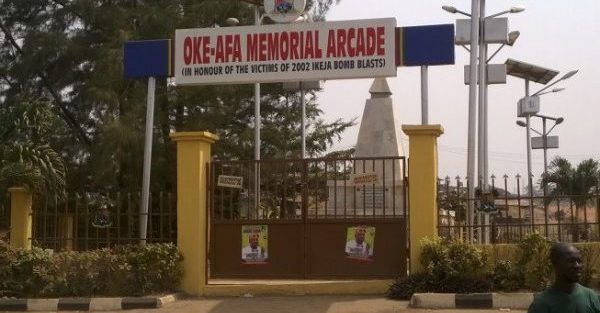January 27, 2002, began like every other day. It was a Sunday and being a Sunday, a day of worship for Christians as well as a day of rest, many went to church, some rested in their homes, some went visiting friends and family, and still some went to their town or club meetings while some went for social functions.
By all accounts, it was a normal day. If only Lagosians had known; but nobody knew, nobody thought, nobody dreamed; not even the prophets, that what began as a normal day would end as a national tragedy.
By the end of that fateful day, over 1,000 Lagosians had lost their lives – men, women and children; the young and the old. Many met their untimely death in an attempt to flee from danger whose source they did not know. All they knew and perhaps cared about at that time was that they had to run for dear life and in their attempt to preserve their lives, they lost it. How tragic!
The Oke – Afa Canal became a mass grave and a watery one at that. The nation was devastated, families were inconsolable; their loved ones had gone without saying good bye.
It all began at about 5p.m that Sunday, January 27, 2002; when the armoury at the Ikeja Cantonment reportedly caught fire setting off some of the ammunitions in the dump. The explosions that followed left people wondering if there had been a coup or if the nation was at war. Many questions ran through the minds of people but since there were no ready answers, people trooped to the streets running in all directions, not knowing where to go or what to do.
The skyline was ablaze with fireworks and since it was neither Christmas nor New Year, Lagosians were confused and scared. As shrapnel, shells, mortar and pieces of metal rained down from the sky and on to roof tops, many people abandoned their houses believing that safety would be found on the streets. Worse hit were those who lived within and around the cantonment. Houses were quaking as though rocked by an earthquake windows were shattered and walls cracked while some houses close to the armoury caught fire and were razed.
In the pandemonium that ensued many sought escape through an apian way that linked the cantonment to Isolo area of Lagos. Little did they know that their ‘way’ to safety was a canal over grown with weeds, and in the panic many died, among them children.
It is exactly 15 years today since the incidence yet the memory of the day is still fresh in the minds of lagosians. Mr. Dom Essien who lived at Ketu at the time of the blast remembers it as though it was yesterday. He recounted his experience to The Next Edition, “as it was a Sunday, I was in my house at Ketu relaxing with a bottle of beer and watching TV. All of a sudden, I heard a loud bang and the ground shook under my feet. I was living on the ground floor of a two-storey building. When I heard the bang, instinctively, I looked at the wall and saw a large crack and I was scared wondering what was happening.
“My Landlord who lived on the last floor ran down to my flat shirtless and in shorts to ask me if I heard the noise. He was really panicked. So I left the house and went into the street to see what was going on. People were running everywhere, in all directions saying that it was either a coup or war but because nothing had happened before then to suggest that there was a war going on, most went with the assumption that it was a coup.
Read also: Benue crisis: NUJ calls for UN intervention
“I trekked from my house to the bus stop where a bus driver told me that there was a ‘commotion’ at Maryland. He too didn’t have the correct information so I returned to my place, took my car and drove to Maryland where I finally got the true story that some ammunitions had exploded in the cantonment. I went home feeling relieved and to reassure my landlord. As at that time, we didn’t know about the casualties. It was indeed a terrible day.”
Mr. Essien also remembered a friend of his losing his younger brother in the incident. According to him, “when the blast occurred, the young man ran out of their house in Shogunle and joined those trying to use the canal. Unfortunately, he was among those who died. If he had stayed at home or within his neighbourhood, he would not have died. That’s why it is not good to panic. When something is happening and you are not sure, don’t just follow the crowd, try to get some information first before you decide what to do,” he advised, adding that many of those who lost their lives in the canal would not have died if they had not panicked.
Mr. Denise Ishiekwene, also remembered the day vividly. His words, “I was in front of the Lagos State University, Anthony Campus, near Maryland, Lagos, with my family. We were driving down to visit my younger brother at Ketu. Suddenly, there was a loud bang that shook the whole area and we all became afraid since the source of the blast was unknown to us. As we drove to my brother’s place the blast continued in succession. When we finally got to his place, we could not stay indoors because we didn’t know what was wrong.
“We stayed outside to observe the area only to see people in the same confusion as we were, wondering what was wrong. The blast kept sounding as if it was happening at the next street. Because we couldn’t find out what was going on, my family and I had to stay at my brother’s place till the next morning before we left for our house at Idimu.
“It was on our way home that we ran into serious vehicular traffic on Isolo/Oke – Afa road caused by the large crowd rushing to see the bodies of those who died as a result of the stampede, that we heard it was a blast at the cantonment. It was such a sad day, I don’t think anybody who was in Lagos that day would forget it.”
Mrs. Hadija Shittu aka, Iya Ibeji, said she would never forget that day because she had never witnessed such a thing all her life. “My friend and I had gone for a party at Abori, after Iyana Ipaja. We were at party when suddenly we started hearing loud sounds. It was going gbum, gbum and looking up, it was as if they were throwing rockets. Everybody was afraid and immediately people started leaving the party. It was not like the party was over but who wanted to stay eating and drinking when we didn’t know what was happening. My friend and I left.
“When we got to Iyana Ipaja, there were so many people at the bus stop. There were people everywhere but no single bus on the road and it was already night. After some time, my friend and I got a bus to Ikeja. We were actually going to Oshodi but couldn’t get any so we took the one going to Ikeja. Little did we know that we were running into the problem. The people at Ikeja bus stop were more than the ones at Iyana Ipaja. At the bus stop, people were saying that they were fighting in the cantonment but nobody could say who was fighting who. Eventually, we saw a pick up going to Maryland and managed to climb in. Before we got to the cantonment, the man told us that he was not going any further. Even though the noise had stopped, there was still confusion on the road.
“My sister, we trekked from there to Anthony before we could get a vehicle. I blamed myself for going out that day, because in all my life I had never trekked such a distance. But nobody knew that such a thing would happen. Ah, it was bad. It was the next day that we found out what really happened. Ah, my sister, I can never forget that day.”
Indeed such a day would be difficult to forget. When tragedies occur on such a large scale, people tend to remember exactly what they were doing when it happened. It is as if the moment is engraved in the memory.
As people who were not directly affected by the incidence vividly recollect, so also would family and friends of those who lost their lives that day remember. It is said that time heals all wounds, it is our hope and prayer that they are comforted.











